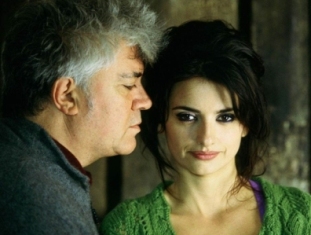Almodovar explores the frontier between art and reality
 Madrid - In Pedro Almodovar's new film Abrazos Rotos (Broken Embraces), movie director Mateo falls in love with his leading actress Lena, who lives unhappily together with their film's rich elderly producer.
Madrid - In Pedro Almodovar's new film Abrazos Rotos (Broken Embraces), movie director Mateo falls in love with his leading actress Lena, who lives unhappily together with their film's rich elderly producer.
The couple's forbidden passion vibrates with all the emotion of a great love story, yet it also has a strangely celluloid quality to it, as if art were truer to life than life itself.
The constant exploration of the frontier between life and cinema is one of the hallmarks of the 57-year-old Spanish director, whose movie is tipped for one of the successes at the Cannes film festival.
Another Spanish director, Isabel Coixet, will also be in the main competition with Mapa de los Sonidos de Tokio (Map of the Sounds of Tokyo).
A Spanish triumph in Cannes would give a welcome boost to the country's film industry, which became known for its freshness and creativity in the 1990's, but has now seen its domestic public at movie theatres decline from about 22 million viewers in 2004 to 14 million in 2008.
Spaniards are not seeing less films, but prefer to buy pirate copies or load them down from the internet, movie professionals say in response to critics who accuse them of living off state subsidies.
The state grants nearly 100 million euros (130 million dollars) in annual subsidies to help the Spanish movie industry defend its market share of about 13 per cent against big-budget Hollywood productions.
Almodovar became known as the enfant terrible of Spanish cinema, but such attempts at classification have now been forgotten as he has become a stylistic category unto himself.
"Reality needed fiction to be more complete, nicer, and easier to live in," Almodovar once wrote about his mother, who embellished letters she read out loud to illiterate inhabitants in the southwestern village where he spent part of his childhood.
But fiction also serves to "show it all, the surface and the underside of things," says the director whose work can be seen as a perpetual attempt to transgress sexual, social and other boundaries.
Almodovar's rise from a village boy to an Oscar-winning director and international celebrity almost reads like a movie script.
Born into a modest family of peasant origin in the windswept region of La Mancha, where Miguel de Cervantes' hero Don Quixote fought windmills, Pedro later moved with his family to the region of Extremadura in the southwest.
He was sent to a Catholic boarding school in Caceres to become a priest, but the city also had a movie theatre.
By the time Almodovar moved to Madrid in 1967, he knew he wanted to make movies, and eventually got a job with the phone company Telefonica to make a living while launching his career.
Almodovar became a central figure in the Madrid "movida," a frenetic and productive burst of nightlife and culture that began smashing sexual and social taboos after the death of dictator Francisco Franco in 1975.
Three decades later, Almodovar has been showered with awards, including Oscars for best foreign-language film for All About My Mother in 1999 and for best original screenplay for Talk to Her in 2002.
His movies have left a trail of "Almodovar girls," actresses who made their names mainly with him, such as Carmen Maura or Victoria Abril.
Almodovar also helped to launch two of Spain's leading international actors, Antonio Banderas and Penelope Cruz, who plays Lena in Broken Embraces.
Calzada de Calatrava-born Almodovar's complex narratives, iconoclastic humour, touches of kitsch, focus on the family, and satire of religion as well as bold exploration of sexuality are admired as hallmarks of his unique style, though they still shock in some quarters.
Almodovar is fascinated by the limits of human identity, especially the sexual one, with gay or transsexual characters appearing in many of his films.
"The moral of all my movies is to get to a stage of greater freedom," says the gay director, who is known for his understanding of the feminine psyche.
Almodovar's creativity extends over a wide range of narrative and stylistic registers, with Broken Embraces combining melodrama and comedy with darker shades.
"Broken Embraces is a romantic film, with intertwining, very intense love stories... but there is also an underlying love story: my love story with cinema," Almodovar says.
Not only does the film contain references to movies by other directors, but it tells the story of a movie whose makers become actors in their own dramatic life stories.
The love story between Mateo and Lena ends in a tragedy which can only be redeemed by finishing the movie they were working on.